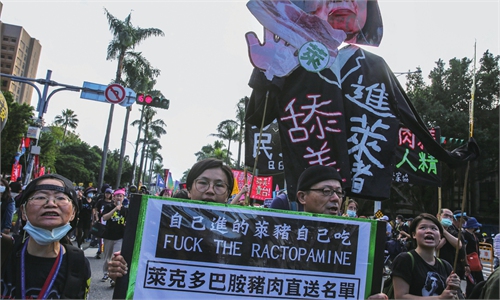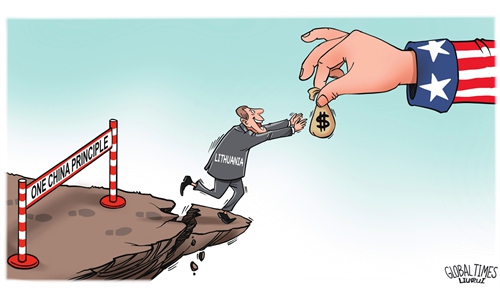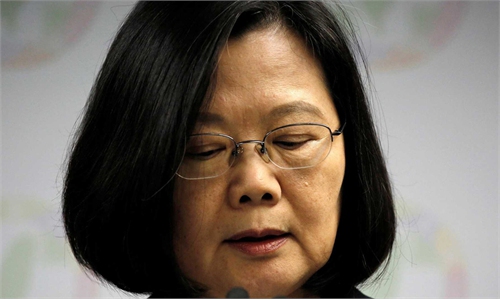GT investigates: Taiwan’s DPP authority splurges on bribes to win international favor, maintain dwindling ‘diplomatic ties’
Cash gambit
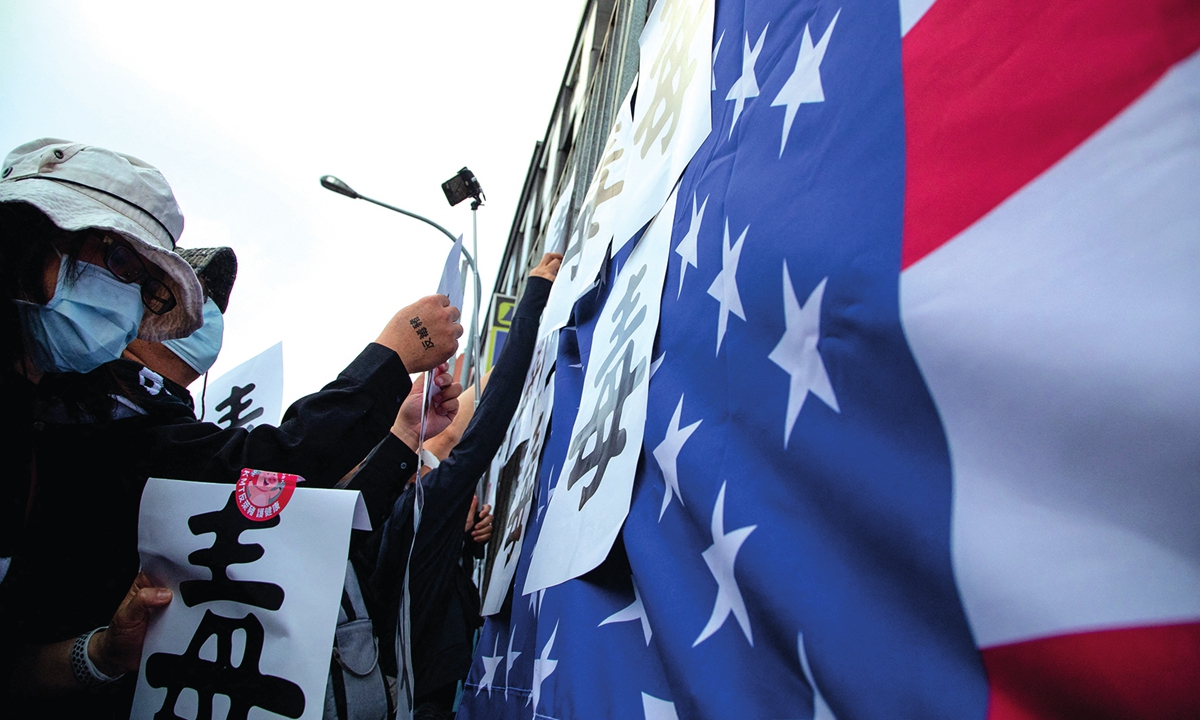
People in Taiwan stick the signs that read "Poison" on the American flag in front of DPP's headquarters during a protest in Taipei on November 22, 2020. Photo: AFP
Recently, Guatemala hired Brian Ballard, a key supporter of former US President Donald Trump, for $900,000, to win favor with US, and the lobbying costs were paid for by Taiwan authorities.The revelation has caused a global stir, which also triggered fierce criticism across the Taiwan Straits for the long-term, ill-intentioned "dollar diplomacy" conducted by the secessionist Democratic Progressive Party (DDP).
Despite the spokesperson of Taiwan's "external affairs," Joanne Ou, quipped that the budget is completely legal, the response drew derision in Western media and outrage in the island of Taiwan.
Since Chen Shui-bian's administration, DPP authority have been particularly keen on "dollar diplomacy." Using taxpayers' hard-earned money to buy so-called "international support" not only satisfies DPP's vanity but also allows them to spend money unchecked, under the guise of "diplomatic confidence."
Observers and experts have pointed out that the current exposure of cash transactions between Taiwan authorities and its "diplomatic allies" is just the tip of the iceberg. The long-standing indiscriminate splurging by the DPP has not only worsened the political ecology of its "allies," but also overextended the already strained levels of trust of the people of Taiwan in the DPP.
People on the island remain confused about how much money DPP authority have spent under the name of "diplomacy," where the money has gone, and what exactly it has bought.
Dirty money deals
"It's unusual for one government to pay the fees for lobbying for another government," the Associated Press quoted from Robert Kelner, an attorney specializing in compliance with foreign lobbying laws.
Taiwan regional leader Tsai Ing-wen's secret payments for Guatemala's "lobbying package" to please the US have exposed a new pattern of "dollar diplomacy" - paying the bill for closer ties between its "allies" and the US, Wang Jianmin, a senior cross-Straits expert at Minnan Normal University, told the Global Times. He stressed that no matter how "innovative" this sort of "dollar diplomacy" seems to be, its core purpose of spending money to preserve its weak relations with "allies" never changed.
The Global Times found that "dollar diplomacy" has been a customary operation of the "external affairs authority" of Taiwan for decades, which has invested huge amounts of manpower and resources in this matter.
The figure has always been large, mainly to countries in the South Pacific, and Central and Latin America, Sheng Jiuyuan, director of the Taiwan Research Center at the Shanghai Academy of Social Sciences, told the Global Times. The money is mainly used in three ways: "dollar diplomacy," so-called cultural and people exchanges to promote the island's ideology, and "political donations" to support certain political figures, said Sheng.
According to Reuters, former Guatemalan President Alfonso Portillo admitted in 2014 to having accepted a $2.5 million bribe from Taiwan during his tenure from 2000 to 2004 in exchange for continued diplomatic recognition and the laundering of money through several banks in the US.
Based on US diplomatic cable dating from 2007 leaked to Wikileak, the Guardian revealed that Nauru maintained a close relationship with the island of Taiwan, largely due to Taiwan's payment of a secret monthly stipend of $5,000 to Nauruan government ministers in exchange for continued "diplomatic ties." Other MPs received $2,500 a month.
The money was described as "project funding that requires minimal accounting," the Guardian reported.
In May 2011, local Panamanian media, La Prensa, revealed that former leader of the Taiwan region, Chen Shui-bian, had designated the donation to Mar del Sur, a private foundation tied to the associates of the former President of Panama, Mireya Moscoso, without conducting any checks. Moscoso's cronies then embezzled $45 million that was supposed to go to local charity work.
And on September 16, 2019, the Solomon Islands decided to break off "diplomatic relations" with the island of Taiwan. According to local Taiwan media, DPP authority attempted to offer $1 million to each official who supported the island of Taiwan, but in the end it proved to be futile.
Prior to that, such monetary offensives were even more intense. According to the Diplomat magazine, in June 2001, authorities in the island of Taiwan announced a $25 million loan to the Solomon Islands to help victims of the ethnic conflict there, but only a few went to legitimate causes, with most of it ending up in the pockets of local politicians and militia leaders.
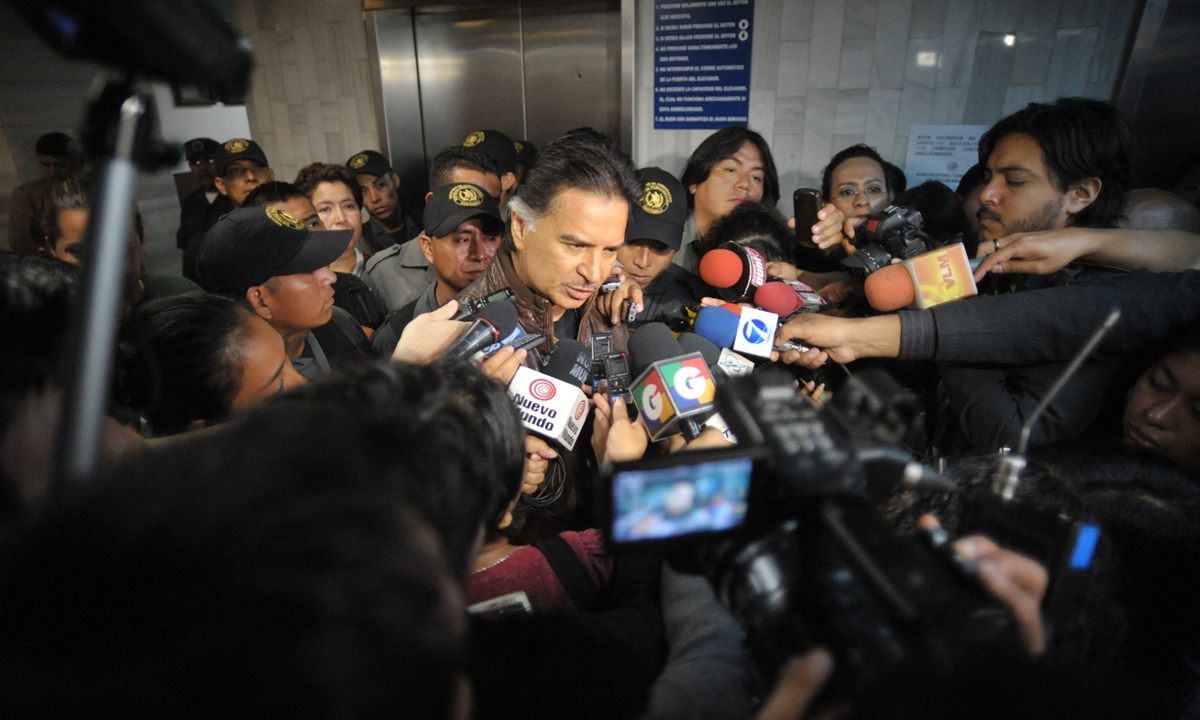
Former Guatemalan President Alfonso Portillo speaks to journalists about charges concerning money laundering upon his arrival at the court of Guatemala City on November 17, 2011. Photo: AFP
Lax regulation and supervision has allowed some of the "dollar diplomacy" packages to be funneled into individual pockets, breeding corruptions, until the scandals would be revealed in internal political battles, Wang said, noting that Taiwan's "dollar diplomacy" has long been considered one of the factors contributing to rampant corruption in Central American countries.The alleged financial aid from the island of Taiwan often turns out to bring few tangible benefits for the local population, Sheng said.
Wide variety of means
The Global Times found that the island of Taiwan's "Ministry of Foreign Affairs" is one of the main agencies leading the so-called "gold diplomacy," and that it sets aside a huge amount of "diplomatic funding" every year in the form of an "open budget" and a "confidential budget." Most of the economic assistance issued to its "diplomatic allies" is included in the public budget, while the non-public items are mainly listed as "international affairs activities" and "foreign loan interest difference subsidy."
In recent years, Taiwan authorities have steadily increased the amount of the alleged "diplomatic budget" despite the dwindling number of "allies." Especially after Tsai took office, the "confidential budget" has increased nearly four fold.
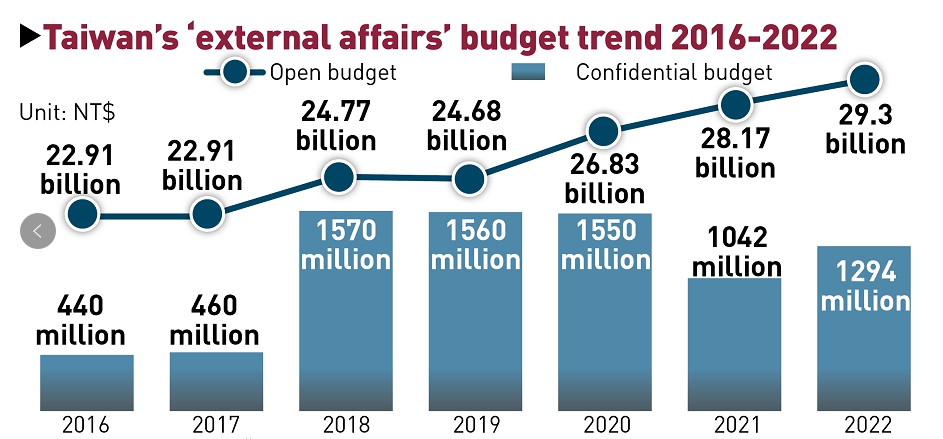
Taiwan's "external affairs" budget trend 2016-2022. Graphic:GT
In 2019, Taiwan politician Lin Yu-fang slammed the Tsai Ing-wen government at a press conference for deceiving the people and failing to shoulder the most basic political responsibility.
In addition to the "external affairs" section, other agencies involved in the island of Taiwan's "money diplomacy" include the Taiwan economic affairs, culture, and defense authorities. Even a large number of non-governmental organizations and individuals supported by the authorities are involved in this "cash diplomacy." Their task is not only to maintain "diplomatic relations" but also to expand the island's international influence by all means.
Observers pointed out that the island's "Legislative Yuan" and the "National Security Bureau" often work with organizations outside their systems to establish ties with foreign anti-China lawmakers through brokers and public relations firms. The Tsai administration bribes these anti-China politicians to speak for the island of Taiwan, or push Taiwan-related bills regarding the Taiwan question,?and through media coverage to increase the island's international visibility.
"We tried our best to invite famous foreign journalists to visit the island of Taiwan at that time, all free of charge," Kuo Kuan-ying, Taiwan's former senior diplomat who once served in the press bureau of the Taiwan "Executive Yuan", told Global Times.
The US Congress is the main target of the DPP's bribe campaign. A significant amount of Tsai's annual "diplomatic confidential budget" is spent on bribing US lawmakers, observer noted, adding that Taiwan's regional leaders often make trips to Caribbean " allies," but their real intention is to pass through the US, trying to use the opportunity to "splash money" to strengthen relations with the US.
"It is unlikely that the island of Taiwan's 'external affairs agencies' take money directly to US politicians because there is little room to conduct such operations. They can only bribe politicians through businessmen, something the island of Taiwan's security services also did," Kuo said.
An island of Taiwan "National Security Council" source also revealed to media that in Japan, in order to circumvent local agencies' strict political contribution regulations, DPP authority bribe Japanese lawmakers through three ways: One is to give favors to Japanese companies that both sponsor anti-China Japanese lawmakers and have trade ties with the island of Taiwan; second, granting Japanese enterprises contract projects in the island of Taiwan to develop "pro-Taiwan" groups in the Japanese government and business circles; third, offering gratuitous financial support to Japanese parliamentarians.
All departments of the island of Taiwan are in the service of expanding diplomatic spaces for the island, in order to further internationalize the Taiwan question, Wang said, adding that, doing so has done nothing but exacerbate tensions between the mainland and the island.
Scandalous futility
"The people of Taiwan have been complaining for a long time. We don't know how much money Taiwan has spent on 'diplomacy' and what benefits are there in the end, but we know that the people of Taiwan are not living well," Leo Wu, a political science PhD candidate at the National Taiwan University in Taipei,told the Global Times.
Kuo noted that because confidential budgets are not subject to rigorous scrutiny, in the island of Taiwan, there are frequent cases of embezzlement of "diplomatic funds."
In 2006, during Chen's administration, Taiwan authorities promised to pay $30 million in technical assistance to a South Pacific country through their "secret envoys." However, it is suspected that the confidential funds were later embezzled by the two brokers.
Wu said their department often discusses the future of Taiwan's "diplomacy" in class, but teachers and most students are pessimistic about this topic.
Since Tsai came to power in 2016, there has been a huge amount of spending but the island lost eight "allies," one after another.
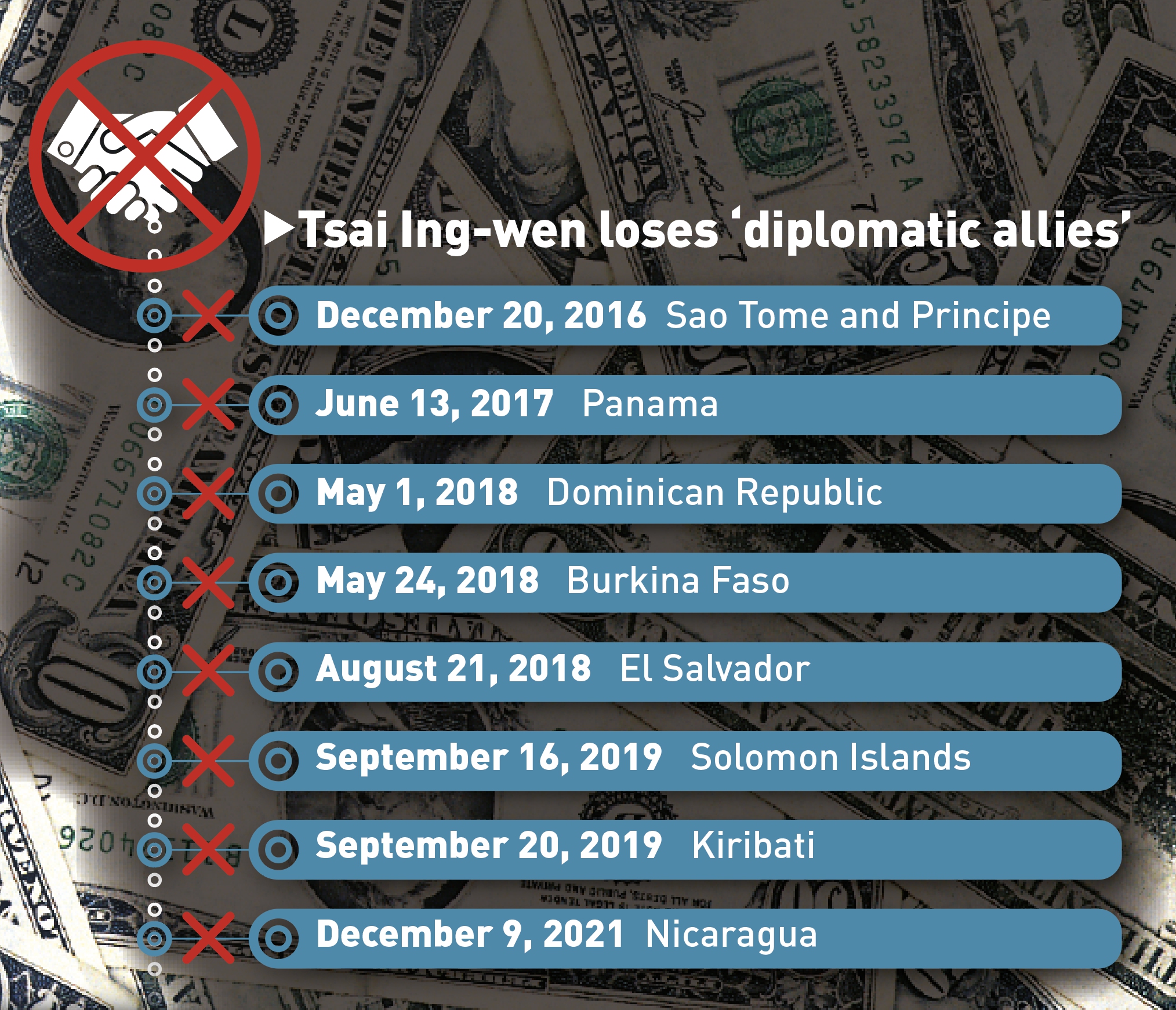
Tsai Ing-wen loses "diplomatic allies." Graphic:GT
What the people of Taiwan really care about is whether their standards of living have improved, but now, with the economy stagnant, DPP leaders are still obsessed with spending money abroad to satisfy their vanity, Wu said"In Taiwan, if there is a conflict between the internal affairs authority and the external affairs department in terms of mission and cost, it is definitely 'diplomacy first,'" Kuo noted.
Taiwan's political trick is nothing but a cover-up. It may seem like a diplomatic breakthrough, but it is actually an international laughing stock, Sheng suggested.
Wang noted that no amount of effort in "dollar diplomacy" will change the international community's position on the island of Taiwan and its adherence to the one-China principle.
"Ironically, Taiwan authorities are proud of this shameful tactic," Sheng said.

